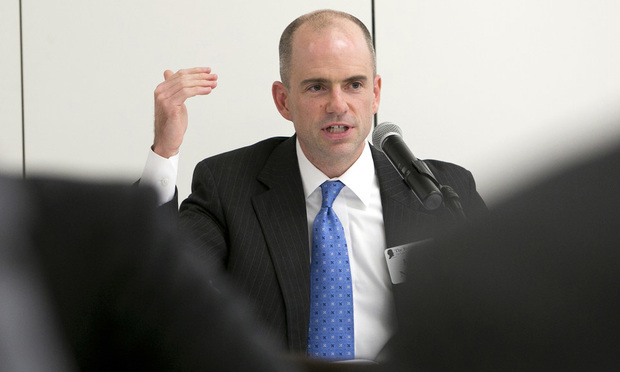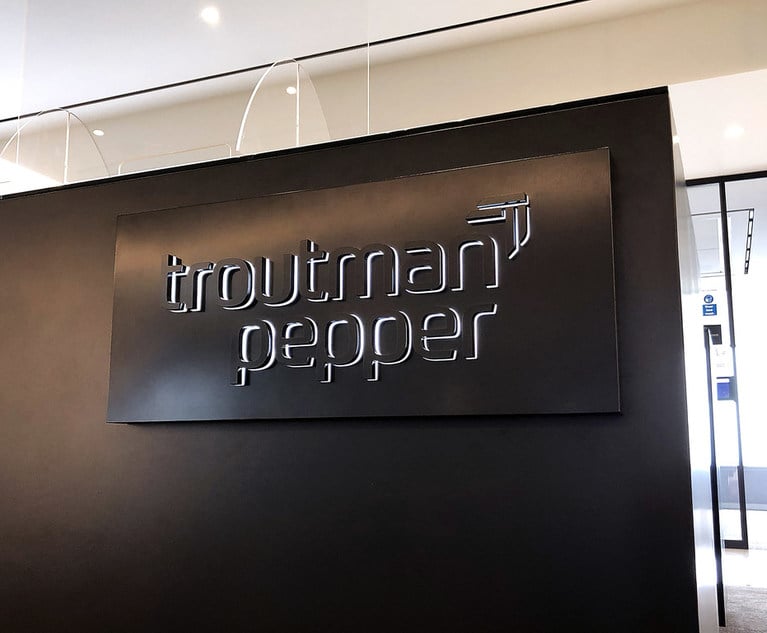Upend Precedent, 11th Circuit Panel Urges in Pensacola Cross Case
A panel of three judges from the circuit court ruled Friday that efforts to keep the cross where it is loses out to precedent from a 35-year-old opinion. But then two of the panel's judges wrote separately to invite a reversal, saying their precedent is wrong. The opinions together totaled 82 pages.
September 10, 2018 at 06:30 PM
8 minute read
 Judge Kevin Newsom, U.S. Court of Appeals for the Eleventh Circuit (Photo: Alison Church/ALM)
Judge Kevin Newsom, U.S. Court of Appeals for the Eleventh Circuit (Photo: Alison Church/ALM)
The legal battle over a giant Latin cross that's been standing in Pensacola's Bayview Park for 75 years, sparked by a plaintiff who the court says sought to hold a satanic ritual nearby, appears bound for en banc review at the U.S. Court of Appeals for the Eleventh Circuit.
A panel of three judges from the circuit court ruled Friday that efforts to keep the cross where it is lose out to precedent from a 35-year-old opinion. But then two of the panel's judges wrote separately to invite a reversal, saying their precedent is wrong. The opinions together totaled 82 pages.
The case has attracted national attention and 35 amicus briefs from other states, religious groups and business organizations.
“The City of Pensacola, Florida appeals a district court decision ordering it to remove a 34-foot Latin cross from a public park on the ground that the City's maintenance of the cross violates the First Amendment's Establishment Clause. Having concluded that we are bound by existing Circuit precedent, we find ourselves constrained to affirm,” the judges said in a 10-page per curiam opinion.
The panel included Judge Kevin Newsom, Senior Judge Frank Hull and U.S. District Judge Charles Ashley Royal of the Middle District of Georgia, sitting by designation.
“We have concluded that we are bound by this Court's decision in American Civil Liberties Union of Georgia v. Rabun County Chamber of Commerce, Inc., 698 F.2d 1098 (11th Cir. 1983), which considered facts nearly indistinguishable from those here,” the judges said. “There, with the approval of the Georgia Department of Natural Resources, the Rabun County Chamber of Commerce erected an illuminated 35-foot Latin cross in Black Rock Mountain State Park.”
Both crosses had stood for many years and had been dedicated at an annual Easter sunrise service. The ACLU of Georgia and named individuals sued, also claiming that the Black Rock cross violated the Establishment Clause. Another panel of Eleventh Circuit judges agreed.
“Our hands are tied,” the three judges said in the Pensacola case. “Absent en banc reconsideration or Supreme Court reversal, we are constrained to affirm the district court's order requiring removal of the Bayview Park cross.”
Appellate lawyers familiar with the Eleventh Circuit said it's not unheard of for one panel to call for en banc review to overrule another.
“That does happen occasionally,” said Laurie Webb Daniel of Holland & Knight. “I have seen it in the Eleventh Circuit before—where the judge feels bound by precedent but thinks the precedent was wrongly decided.”
“I have seen several cases where concurring judges claim the outcome is wrong, but they are bound by precedent to vote for it, and they invite the Supreme Court to grant cert and reverse,” said Michael Terry of Bondurant Mixson & Elmore. “The problem is they are bound by prior panel precedent and have to follow it until the court goes en banc to reverse it. So, if they think the prior opinion is wrong, they still have to follow it and, instead of dissenting, they urge reversal of the prior opinion/precedent.”
In the Pensacola case, Newsom wrote separately, concurring in the judgment but saying that correctly following Eleventh Circuit precedent means violating U.S. Supreme Court precedent. “I urge the full Court to rehear this case en banc so that we can correct the errors that Rabun perpetuates,” Newsom said.
“Under the Supreme Court's pathmarking Establishment Clause standing case, Valley Forge Christian College v. Americans United for Separation of Church & State, Inc., 454 U.S. 464 (1982), the plaintiffs' allegations here—offense, affront, exclusion—are plainly inadequate,” Newsom said. “There, the Court held, in no uncertain terms, that 'the psychological consequence presumably produced by observation of [religious] conduct with which one disagrees' is 'not an injury sufficient to confer standing under Art[icle] III, even though the disagreement is framed in constitutional terms.'”
But the next year, the circuit took a different stance in the Rabun County case.
“It seems clear to me that Rabun was wrong the day it was decided—utterly irreconcilable with the Supreme Court's then-hot-off-the-presses decision in Valley Forge,” Newsom said. “And to make matters worse, Rabun has only gotten more wrong as time has passed. Since 1983, the Supreme Court has consistently tightened standing requirements.”
Royal also wrote separately, concurring in the judgment but agreeing with Newsom that the full court should review and reverse it. But Royal also added a history of Christianity going back to 380 A.D. and the Edict of Thessalonica.
“Roman Emperor Theodosius I established the Nicene Creed form of Christianity as the official religion of the Roman Empire,” Royal said. “The Edict imposed punishments.”
Likewise, some early American laws later overturned required collection of taxes for churches or otherwise oppressed nonbelievers, he said.
“Placing a cross in a public park that many people have enjoyed for decades, that stands mute and motionless, that oppresses no one, that requires nothing of anyone, and that commands nothing does not violate the Establishment Clause. Nor is it religious oppression. The cross can only cast a shadow; it cannot cast any harm,” Royal said.
Royal cited plaintiff David Suhor's affidavit saying he rides his bike regularly in the park, as often as twice a week, despite the fact that he first encountered the cross in 1993 but “does not wish to encounter Bayview Cross in the future.”
However, Royal noted, Suhor recently booked the amphitheater by the cross for a satanic ritual.
“That the City permitted a satanic ceremony by a Christian cross demonstrates classic religious freedom,” Royal said. “It also shows religious pluralism. The City did not coerce him to do anything, and more importantly, he was not restrained from enjoying his satanic ceremony in the exercise of his religious freedom. Consequently, the City did not disparage or deprecate his beliefs or dictate his behavior in the park, and the cross did not stigmatize or ostracize him.”
Both sides drew encouragement from the set of opinions Monday.
The Washington, D.C.-based American Humanists Association, representing the plaintiffs, called it a “big win” in a news release.
“The Eleventh Circuit's decision properly recognized controlling precedent requires the removal of this enormous government-owned Christian cross prominently displayed in a popular city park,” said Monica Miller, AHA's senior counsel and lead attorney on the case. “The decision harmonizes with decades of Establishment Clause precedent finding similar government cross displays unconstitutional.”
That's not how the decision looked to the city of Pensacola and its lead counsel, Luke Goodrich of the Becket Fund for Religious Liberty in Washington, D.C.
“The Constitution doesn't require the government to scrub every religious symbol from the public square,” Goodrich, vice president and senior counsel at Becket, said in a news release. “The Supreme Court has repeatedly said that the government can recognize religion as a fundamental part of our history and culture, and we're glad that the majority of the court agreed that the cross is constitutional.”
The city's news release said a wooden cross was first placed in Pensacola's Bayview Park in 1941 by the local chapter of the Junior Chamber of Commerce (Jaycees), a private, civic, nonprofit organization, as the United States prepared to enter World War II. For decades, the Jaycees and other groups have hosted community events at the memorial, including Veterans Day and Memorial Day remembrances. It remains a gathering place for religious and nonreligious groups within the Pensacola community, the city said. The cross is one of some 170 displays in Pensacola parks reflecting different aspects of the city's history and culture, the city said.
“This cross is more than a religious symbol,” Ashton Hayward, mayor of Pensacola, said in the city and the Becket Fund's joint statement. “It's an important part of our city's history and culture. … To tear down this symbol just because a few are offended by it shows hostility to religion, not neutrality.”
Hayward added, “The city looks forward to being vindicated on appeal—as the majority of the court said it should be.”
This content has been archived. It is available through our partners, LexisNexis® and Bloomberg Law.
To view this content, please continue to their sites.
Not a Lexis Subscriber?
Subscribe Now
Not a Bloomberg Law Subscriber?
Subscribe Now
NOT FOR REPRINT
© 2025 ALM Global, LLC, All Rights Reserved. Request academic re-use from www.copyright.com. All other uses, submit a request to [email protected]. For more information visit Asset & Logo Licensing.
You Might Like
View All
Troutman Pepper Says Ex-Associate Who Alleged Racial Discrimination Lost Job Because of Failure to Improve
6 minute read
Apply Now: Superior Court Judge Sought for Mountain Judicial Circuit Bench
3 minute read
Law Firms Expand Scope of Immigration Expertise Amid Blitz of Trump Orders
6 minute read
Bass Berry & Sims Relocates to Nashville Office Designed to Encourage Collaboration, Inclusion
4 minute readTrending Stories
- 1'Lookback Window' Law for Child Abuse Cases Constitutional, State High Court Finds
- 2Troutman Pepper Says Ex-Associate Who Alleged Racial Discrimination Lost Job Because of Failure to Improve
- 3Texas Bankruptcy Judge Withdraws Ethics Complaint Against Jackson Walker
- 4Apply Now: Superior Court Judge Sought for Mountain Judicial Circuit Bench
- 5Harrisburg Jury Hands Up $1.5M Verdict to Teen Struck by Underinsured Driver
Who Got The Work
J. Brugh Lower of Gibbons has entered an appearance for industrial equipment supplier Devco Corporation in a pending trademark infringement lawsuit. The suit, accusing the defendant of selling knock-off Graco products, was filed Dec. 18 in New Jersey District Court by Rivkin Radler on behalf of Graco Inc. and Graco Minnesota. The case, assigned to U.S. District Judge Zahid N. Quraishi, is 3:24-cv-11294, Graco Inc. et al v. Devco Corporation.
Who Got The Work
Rebecca Maller-Stein and Kent A. Yalowitz of Arnold & Porter Kaye Scholer have entered their appearances for Hanaco Venture Capital and its executives, Lior Prosor and David Frankel, in a pending securities lawsuit. The action, filed on Dec. 24 in New York Southern District Court by Zell, Aron & Co. on behalf of Goldeneye Advisors, accuses the defendants of negligently and fraudulently managing the plaintiff's $1 million investment. The case, assigned to U.S. District Judge Vernon S. Broderick, is 1:24-cv-09918, Goldeneye Advisors, LLC v. Hanaco Venture Capital, Ltd. et al.
Who Got The Work
Attorneys from A&O Shearman has stepped in as defense counsel for Toronto-Dominion Bank and other defendants in a pending securities class action. The suit, filed Dec. 11 in New York Southern District Court by Bleichmar Fonti & Auld, accuses the defendants of concealing the bank's 'pervasive' deficiencies in regards to its compliance with the Bank Secrecy Act and the quality of its anti-money laundering controls. The case, assigned to U.S. District Judge Arun Subramanian, is 1:24-cv-09445, Gonzalez v. The Toronto-Dominion Bank et al.
Who Got The Work
Crown Castle International, a Pennsylvania company providing shared communications infrastructure, has turned to Luke D. Wolf of Gordon Rees Scully Mansukhani to fend off a pending breach-of-contract lawsuit. The court action, filed Nov. 25 in Michigan Eastern District Court by Hooper Hathaway PC on behalf of The Town Residences LLC, accuses Crown Castle of failing to transfer approximately $30,000 in utility payments from T-Mobile in breach of a roof-top lease and assignment agreement. The case, assigned to U.S. District Judge Susan K. Declercq, is 2:24-cv-13131, The Town Residences LLC v. T-Mobile US, Inc. et al.
Who Got The Work
Wilfred P. Coronato and Daniel M. Schwartz of McCarter & English have stepped in as defense counsel to Electrolux Home Products Inc. in a pending product liability lawsuit. The court action, filed Nov. 26 in New York Eastern District Court by Poulos Lopiccolo PC and Nagel Rice LLP on behalf of David Stern, alleges that the defendant's refrigerators’ drawers and shelving repeatedly break and fall apart within months after purchase. The case, assigned to U.S. District Judge Joan M. Azrack, is 2:24-cv-08204, Stern v. Electrolux Home Products, Inc.
Featured Firms
Law Offices of Gary Martin Hays & Associates, P.C.
(470) 294-1674
Law Offices of Mark E. Salomone
(857) 444-6468
Smith & Hassler
(713) 739-1250






